|
|
|
|
|
|

The loss of the emergency department in Bourbon County on December 20 is on the minds of many in the community.
Ascension Via Christi Emergency Department cited “a steady decline in visits and its overall average daily census” in the press release announcing the closure.
Ascension Via Christi to close Emergency Department in Fort Scott on Dec. 20
Gregg Motley, Southeast Kansas Regional Manager of Landmark National Bank, proposed a question-and-answer interview on the current medical issues between him and Dr. Randy Nichols that would answer some of the questions the community has. Here is the interview.
Dr. Randy Nichols, who recently retired from a long medical practice in Bourbon County, answers some frequently asked questions from Bourbon County residents about the future of Emergency Room services in Bourbon County.
Motley:
Why do we need an emergency room? Would a great ambulance service with high-quality Emergency Medical Services personnel be just as good?
Nichols:
Emergency Medical Services (EMS) and Emergency Rooms (ER) are mutually beneficial services. EMS is to evaluate the on-scene emergency needs, provide the care available on the ambulance, and transport to the closest appropriate ER. Once EMS is involved, they are legally required to transport the patient to the closest appropriate ER. An ER, on the other hand, is available to both ambulance transfers and “walk-ins” seeking emergency care. An ER has lab and x-ray diagnostic capabilities. It has treatment options not available on an ambulance. Following diagnostic evaluation, a patient can be treated and dismissed or stabilized and transferred for hospitalization to a facility offering the needed services.
Let’s look at our utilization numbers to understand why EMS alone is not adequate. Approximately 2/3 of our ER visits do not arrive by ambulance. Of our total ER visits, less than ¼ ultimately require hospitalization. If most of the people seeking emergency care can no longer bring themselves to a local facility, the number of ambulance calls, and therefore number of transports out of the county, could triple. To staff this would be a prohibitive expense. More importantly, emergencies aren’t scheduled, so if multiple health events occur at the same time without a local ER, our ambulance system could be overwhelmed: people will be waiting longer and some will not get the care they need in a timely manner. Additionally, some people may choose to “ride it out” at home rather than call an ambulance or make a long drive to the closest ER. Both of these decisions put people at increased risk.
A brick-and-mortar ER is foundational to the safety and well-being of our community.
Motley:
Could a stop at an ER without an attached hospital jeopardize the life of a critically ill patient by delaying a life-saving treatment?
Nichols:
EMS is obligated to take a patient to the closest ER providing the needed level of care. However, that care may be identified as a need to stabilize in the local ER while arranging transport to a higher level of care. This is often a more controlled situation, improves patient safety, and, if for example Life Flight needs to be called, may shorten the time to distant hospitals.
Motley:
Why is government being asked to subsidize a private corporation? Do other rural communities fund / subsidize their ERs.
Nichols:
Healthcare reimbursement is unlike other business models. In order to get paid, a healthcare organization must meet a rigid group of CMS (Center for Medicare and Medicaid) standards. Reimbursement is based on “customary and reasonable” and/or negotiated fees. Reimbursement doesn’t equal charges and in many cases, episodes of care are never paid. To have an ER, a subsidy is needed whether it is private or “not for profit.” Of course, the subsidy needs to be based on real and regularly verified numbers.
Many other communities subsidize their health care. In our area, Iola, Garnett, and Parsons all subsidize. Nevada has a ½ cent sales tax to support their hospital. Ottawa, Kansas subsidizes about $2 million yearly to cover the cost of indigent care. In Kansas, more than 50 hospitals are at risk of closure. The Kansas Hospital Association reports many of these would already be closed if not supported by local subsidies.
Motley:
Are there subsidies for rural health care out there to lighten our local burden? Is it anticipated this will be a perpetual subsidy for the taxpayers of Bourbon County?
Nichols:
Federal designation as a Rural Emergency Hospital (REH) is being pursued. REH would pay $2-3 million a year as a facility fee. This would support an ER and a limited number of 24-hour observation beds. REH would provide long-term stability to our situation and probably eliminate the need for subsidy. Without REH, the need for an ongoing subsidy will be our responsibility.
Motley:
Will the rural health care system be fixed?
Nichols:
To fix rural health care our legislators must understand how it is broken. Please communicate with them your needs and concerns. In our immediate situation, we need help with waivers of the current rules limiting our ability to have an ER. First is a law dictating that the sponsoring hospital must be within 35 miles. The other is a waiver related to the timing of the closure of our hospital as it relates to qualifying for REH. Please continue to ask our representatives for their help.
The holiday season can bring a wide array of emotions, and for many, that includes grief.
Grief is a profound sorrow, especially one that is caused by someone’s death.
“The key thing to remember is grief looks different for each and every one,” says Behavioral Health provider Sara Jarrett, LMSW. “We have all lived our own experiences. Because of this, and because the circumstances surrounding each person’s passing vary, none of us experience grief in the exact same way.”
Grief can be caused by many things. It could be the first holiday season without a loved one. You may have recently finalized a divorce, and your children will spend the holiday with an ex-spouse. Perhaps you’ve moved, or other family members have moved, and you won’t be together as you were in previous years. Maybe your family is alive and well, but you’ve had to set a healthy boundary to protect your peace, so you’re spending the holidays without them.
No matter the situation, grief is heavy and unpredictable. It has no timeline, and healing doesn’t always happen as quickly as we’d like.
How to deal with grief during the holidays
These nine points can help, but there’s no wrong or right way.
Trust that grief is part of healing
Time does not heal the pain associated with loss; It is what we do with the time that matters.
Grief is a process by which we heal. Experiencing the pain, rather than trying to escape it, can help us feel betterin the long term
.
Set healthy boundaries
We don’t have to force ourselves to face every holiday event or celebratory tradition. If attending a family dinner or participating in the office gift swap will bring too many painful memories this year – be willing to say no. Other people may try to convince you and tell you what you should do, but it’s okay to say no.
Focus on what you can control
We can’t control many things about the holidays, such as being subjected to Christmas music in waiting rooms or hearing co-workers discuss holiday plans. There are some things we can control. We can plan ahead and acknowledge within ourselves that this time of year is hard. We can make a list of things that make us happy and find ways to incorporate those things into our now.
Plan ahead
Often, the anticipation over how hard something will be is worse than the event. While Thanksgiving dinner may be only two hours long, we can easily spend weeks dreading it. Instead, creating a simple plan for getting through the holiday could be helpful.
Allow yourself to feel a range of emotions
The holidays can bring many different emotions. You might feel joy, guilt, and sadness all within a few minutes. Allow yourself to feel those emotions without judging yourself. Don’t judge yourself for feeling happy or laughing. It’s okay to feel however you feel.
Find a way to honor your memories
Find a special way to honor the person you have lost. For some, that may mean setting an extra spot for them at dinner. If a tradition is ending for you, journal how things used to be or share those memories with loved ones.
Create new traditions
Don’t be afraid to start new traditions this year. It’s okay to think outside the box to alter old traditions and make them work with this new phase of life.
Do something kind for others
It can be helpful to a grieving person’s spirit if we find a way to help others. Finding a way to serve a purpose in other’s lives can remind us we have more to give to the world. Feeling connected and part of
something is always important.
Ask for help
Whether a loved one has passed, a tradition has concluded, or our perspective around relationships has changed, we don’t have to do it alone. It’s okay to reach out to a friend and say, “I need you.” It’s okay to sell someone, “I don’t know how to do this anymore.” When we need help, we need to ask for help from a friend or a professional.
Talking to a behavioral health provider can be helpful when dealing with grief. Make an appointment with a CHC/SEK Behavioral Health Provider by calling 620-231-9873.
FORT SCOTT — Community Health Center of Southeast Kansas in Fort Scott has been awarded a three-year term of accreditation in computed tomography (CT) for adult and pediatric scans as
the result of a recent review by the American College of Radiology (ACR).
The location is also accredited by the ACR for mammography.
CT scanning — sometimes called CAT scanning — is a noninvasive medical test that helps physicians diagnose and tailor treatments for various medical conditions. Mammograms are X- ray images of your breasts designed to detect cancers and other changes in breast tissue.
The ACR gold seal of accreditation acknowledges CHC/SEK’s commitment to the highest level of ACR practice and technical standards for image quality, patient safety, staff qualifications,
facility equipment, quality control and quality assurance.
“Having CT in our facility gives the patient access to affordable scans if they don’t have insurance, or if they have high deductible insurance, it gives them the option to receive a CT
scan that they wouldn’t receive because they couldn’t afford it,” said Kimberly Wass RT(R). “On- site CT allows our clinicians to diagnose and treat sooner because it removes hospital
scheduling backlogs and transportation barriers for the patients.”
The same is with mammography. Although breast cancer screening cannot prevent breast cancer, it can help find breast cancer early, when it is easier to treat.
Radiologist reports are received quickly and to the doctor, so the patients are notified in a timely manner of what’s going on, Wass said adding, “And, if there’s anything of concern, we’re able to ‘cloud’ our scans to other facilities. We don’t have to worry about creating a disk to be mailed, or carried by the patient if we are sending them on to a specialist or a hospital.”
CHC/SEK has CT and mammography services in Fort Scott and Pittsburg. For more information
about CHC/SEK CT and mammography services call 620-231-9873 or visit www.chcsek.org
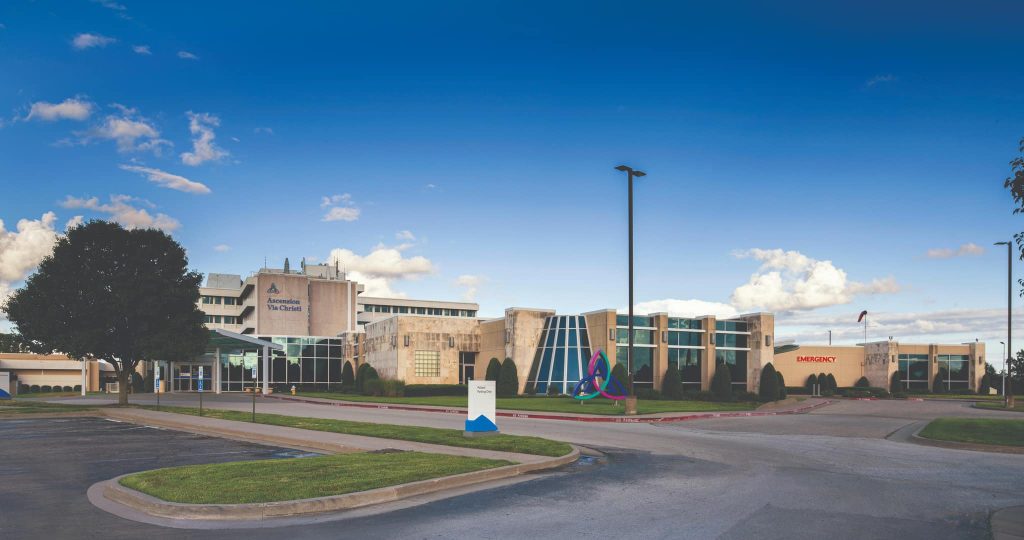
Ascension Via Christi Hospital in Pittsburg earns Leapfrog ‘A’ for safety
Ascension Via Christi Hospital in Pittsburg has received an “A” Leapfrog Hospital Safety Grade for fall 2023, a national distinction that recognizes hospitals’ achievements in protecting patients from preventable harm and error.
“Receiving this recognition is truly a testament to the professionalism, dedication to safe patient care and the skills of our nurses, techs, medical staff and associates in our support staff,” says Drew Talbott, hospital president.
The Leapfrog Group, an independent national watchdog organization, assigns an “A,” “B,” “C,” “D,” or “F” grade to general hospitals across the country based on more than 30 national performance measures reflecting errors, accidents, injuries and infections, as well as systems hospitals have in place to prevent harm.
The Leapfrog Hospital Safety Grade is the only hospital ratings program based exclusively on hospital prevention of medical errors and harms to patients. The grading system is peer-reviewed, fully transparent and free to the public. Grades are updated annually in the fall and spring.
“I appreciate every single one of our associates and medical staff and am thankful for the collaboration and teamwork that led us to achieve such an impactful recognition,” says Talbott.
To see details of Ascension Via Christi Hospital in Pittsburg’s grade and access patient tips for staying safe in the hospital, visit HospitalSafetyGrade.org.
About Ascension Via Christi
In Kansas, Ascension Via Christi operates seven hospitals and nearly 80 other sites of care and employs approximately 6,200 associates. In FY2023, Ascension Via Christi provided more than $65 million in community benefit programs. Serving Kansas for more than 135 years, Ascension is a faith-based healthcare organization committed to delivering compassionate, personalized care to all, with special attention to persons living in poverty and those most vulnerable. Ascension is the leading non-profit and Catholic health system in the U.S., operating more than 2,600 sites of care – including 145 hospitals and more than 40 senior living facilities – in 19 states. Visit www.ascension.org.
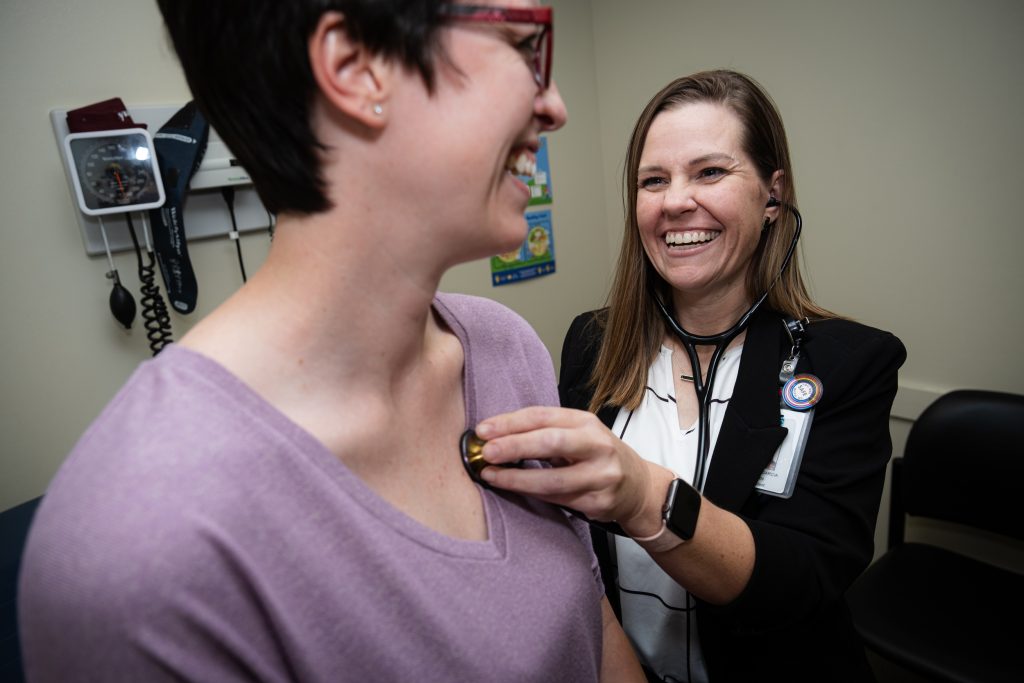
Community Health Center of Southeast Kansas Nurse Practitioner Crystal Garcia, DNP, APRN, FNP-C, AAHIVS, joins CHC/SEK’s Family Physician Julie Stewart, MD, as the second HIV
Specialist at CHC/SEK.
Garcia recently completed her certification through the American
Academy of HIV Medicine.
“I’m so excited to have another HIV Specialist on our CHC/SEK Infectious Disease team,” Stewart said. “Crystal has a heart for the patients and the knowledge to care for them with
excellence. We are blessed to have her expertise on our growing team as we reach more and more patients each day.”
Prior to the inception of CHC/SEK’s Infectious Disease team, people living with HIV had to travel up to three hours to see their HIV Specialist in Wichita or Kansas City or wait up to 12
weeks for an HIV Specialist to come to them in Pittsburg. Now, between Garcia and Stewart, they can stay in their hometowns and get care five days a week.
Garcia also just entered into a year-long training through the Midwest AIDS Training and Education Center’s (MATEC) Clinical Scholar Program with the University of Kansas School of
Medicine.
The program pairs participants with a mentor, provides access to clinical consultations with otherHIV providers, and there are many opportunities to advance their knowledge through live and
virtual meetings and sessions. Garcia’s mentor is Donna E. Sweet, MD, AAHIVS, MACP, a Professor of Medicine from the University of Kansas School of Medicine-Wichita. Sweet has been at the front of fighting HIV and AIDS in Kansas for 30 years. Garcia has monthly meetings with Sweet and will have the opportunity to shadow her in the clinic several times this fall.
“This program offers so many resources and education that I will be able to pass on to patientsthat we serve to improve their retention in care and their overall health,” Garcia said.
HIV specialists provide and have access to wrap around care that includes evidenced based practice knowledge to help those diagnosed with HIV. This increases engagement in treatment,
retention in care and decreases the effects this virus can have if not adequately controlled, Garcia said.
HIV specialists not only diagnose and treat individuals with HIV, but they also work to prevent others from acquiring it, Garcia said, adding that the treatment of HIV has come so far in the 40 years that individuals with HIV when engaged in care with an HIV specialist, can have a very positive prognosis.
“By being able to care for individuals diagnosed with HIV, we often are a ray of hope in someone’s life that they may not have seen on their own,” Garcia said. “This diagnosis can come
with so many negative thoughts and feelings that often individuals are ashamed and would rather not come into care due to fear and the unknown.
“It is beyond rewarding to be able to help people diagnosed with HIV understand their diagnosis and how it is very manageable throughout their lifespan. As a provider for people living with
HIV, there is a very unique connection that occurs and sometimes the person just needs acceptance and to be heard to see their life is not over and their future can look very parallel to what they planned prior to their diagnosis.”
Garcia is also nearing completion of an Internal Medicine fellowship with Stewart, a 12-month program designed to be an internal medicine/infectious disease fellowship within CHC/SEK. She
spent the first three months side-by-side with Stewart for every patient she interacted with, before seeing patients independently at the CHC/SEK Baxter Springs, Columbus, Coffeyville,
Fort Scott, Iola, and Pleasanton clinics.
She also regularly has appointments via Telehealth to
Independence and Parsons. Occasionally, on an emergency basis, she will Telehealth into other clinics, such as CHC/OK in Miami.
“I believe Dr. Stewart and I have built a very solid professional relationship that only adds to
each patient’s care,” Garcia said. “Our patients are aware we are a team and very much operate under this mindset to provide each patient with what they need and want from their healthcare.
“This last year has been a steep learning curve that has forced me to dive deep into myself and hustle for a goal that I truly believe benefits each patient. This fellowship is a huge building
block that enhances my professional ability to improve my practice.”
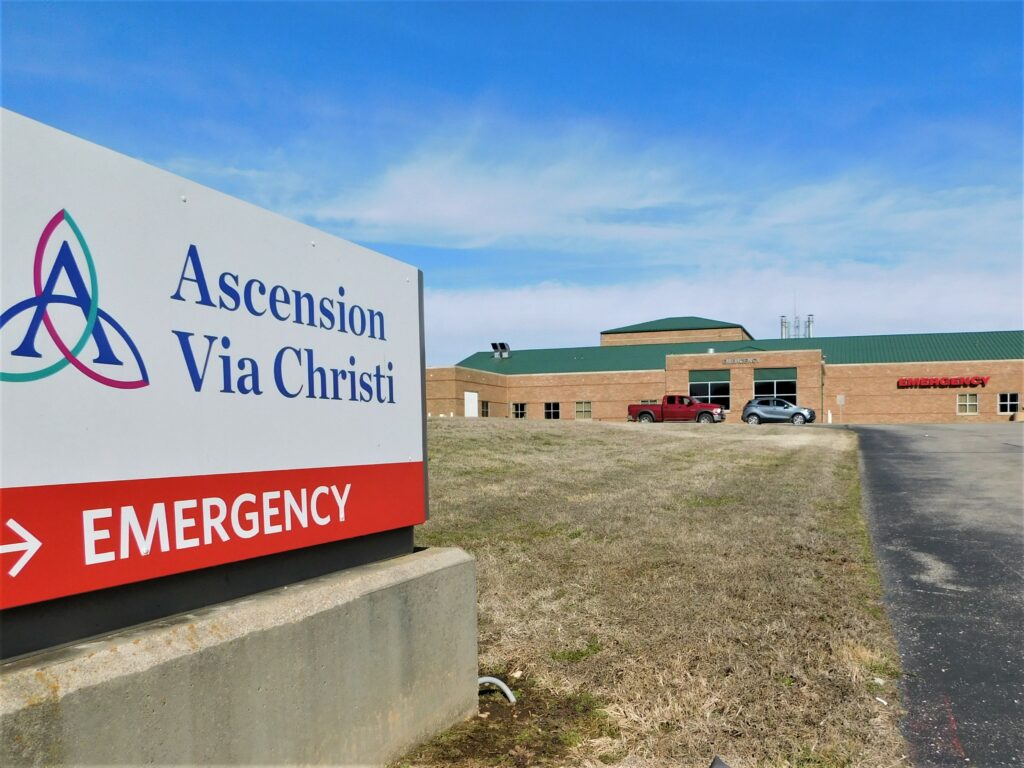
Yesterday it was announced they will be closing operations at the site, 401 Woodland Hills Blvd., Fort Scott, on Dec. 20.
“This department has seen a steady decline in visits and its overall average daily census,” according to the AVC press release: Ascension Via Christi to close Emergency Department in Fort Scott on Dec. 20. “These factors, coupled with other economic challenges, have limited the emergency department’s ability to continue operations.”
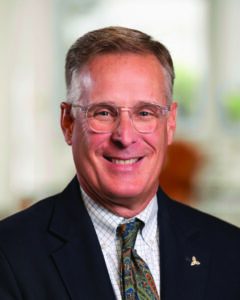
“There are other providers in the region positioned to serve the residents of Fort Scott and neighboring communities,” Drew Talbot, president of Ascension Via Christi, Pittsburg, said in the press release. “These providers will help us ensure continuity of care for our patients as we approach closure.”
Fort Scott Mayor Matthew Wells is thankful to Ascension Via Christi (AVC) for providing an emergency department in Bourbon County, he said.

“I am incredibly saddened by the news that Ascension Via Christi’s Emergency Department in Fort Scott is closing. Bourbon County residents have already had to drive 30 miles to Pittsburg – or, in some cases, 90 miles to Kansas City – for most care since Mercy Hospital closed five years ago. Now, even in emergencies, they’ll have one less place to turn, threatening their health and safety.
“I’ve been touring the state rallying for Medicaid Expansion for six weeks, and in that time, we’ve seen a rural hospital and now an emergency room close. How much more evidence do we need that rural communities need our support to keep health care affordable and accessible? Enough is enough. It’s time to act.”
The Kansas Department of Commerce Rapid Response Team is reaching out to Ascension Via Christi leadership and will be sharing resources with employees who are now looking for work, according to the press release.
According to the Governor’s press release:
|
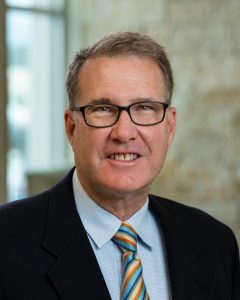
Urologist Mark Frogge, MD, FACS, has joined Ascension Via Christi Hospital in Pittsburg.
Dr. Frogge will see patients at Ascension Via Christi’s new Urology Clinic in Pittsburg, located at 2701 S. Rouse St., starting Nov. 1.
As an Oklahoma City native, Dr. Frogge knows the importance of close-to-home, community-based care and is excited to care for the Pittsburg community.
Dr. Frogge earned his Doctor of Medicine degree from the University of Kansas and then did his residency through the Naval Medical Center in San Diego, CA. In addition to being a urologist, he is a fellow of the American College of Surgeons.
Prior to joining Ascension Via Christi Hospital, Dr. Frogge spent over two decades caring for patients in California to Missouri and Kansas. He has been board-certified since 2000.
“We are excited to have Dr. Frogge at our new Urology Clinic to further improve access to care for our community,” says Drew Talbott, hospital president. “Dr. Frogge’s values, passion and patient-first mindset will make him a great fit for our Ascension Via Christi team.”
Patients can schedule an appointment with Dr. Frogge by calling 620-235-7529. For more information, visit ascension.org/pittsburgKS.
About Ascension Via Christi
In Kansas, Ascension Via Christi operates seven hospitals and nearly 80 other sites of care and employs approximately 6,200 associates. In FY2023, Ascension Via Christi provided more than $65 million in community benefit programs. Serving Kansas for more than 135 years, Ascension is a faith-based healthcare organization committed to delivering compassionate, personalized care to all, with special attention to persons living in poverty and those most vulnerable. Ascension is the leading non-profit and Catholic health system in the U.S., operating more than 2,600 sites of care – including 145 hospitals and more than 40 senior living facilities – in 19 states and the District of Columbia. Visit www.ascension.org.
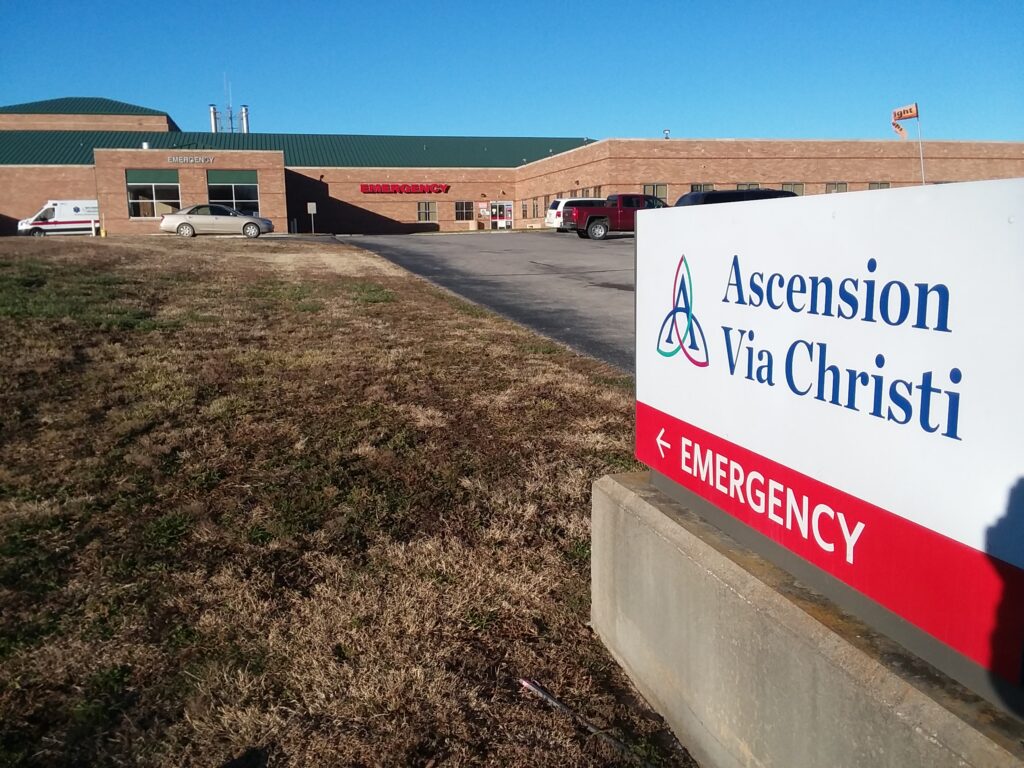
Ascension Via Christi will cease operations at its emergency department in Fort Scott on Wednesday, Dec. 20. This decision was made after a thorough analysis of trend data, patient census, and the current and future challenges and opportunities facing this facility.
Over the past several years, a multidisciplinary team that includes Ascension Via Christi clinical and operational leaders have been working together to understand the current operating environment at the Emergency Department in Fort Scott. This department has seen a steady decline in visits and its overall average daily census. These factors, coupled with other economic challenges, have limited the emergency department’s ability to continue operations.
“After exploring the options available, it was clear that this was the only option for us. There are other providers in the region positioned to serve the residents of Fort Scott and neighboring communities. These providers will help us ensure continuity of care for our patients as we approach closure,” says Drew Talbott, president of Ascension Via Christi Hospital in Pittsburg.
Ascension Via Christi is committed to supporting associates, patients and community members through this transition.
About Ascension Via Christi
In Kansas, Ascension Via Christi operates seven hospitals and nearly 80 other sites of care and employs approximately 6,200 associates. In FY2023, Ascension Via Christi provided more than $65 million in community benefit programs. Serving Kansas for more than 135 years, Ascension is a faith-based healthcare organization committed to delivering compassionate, personalized care to all, with special attention to persons living in poverty and those most vulnerable. Ascension is the leading non-profit and Catholic health system in the U.S., operating more than 2,600 sites of care – including 145 hospitals and more than 40 senior living facilities – in 19 states and the District of Columbia. Visit www.ascension.org.

We’ve all seen the Medicare ads that will make you wonder if you are missing out on important benefits. This is not necessarily the case and there is no need to ponder this concern alone! Trained and unbiased Senior Health Insurance Counselors are available to visit with you and see what works best for your situation.
Medicare Annual Election Period, running from October 15th-December 7th, is a great time to ask your questions! Call 620-244-3826 to schedule an appointment. Until then, here are some Medicare basics:
Medicare is a federal health insurance program that can cover:
Medicare Part A is hospital insurance that covers:
Medicare Part B is medical insurance that covers:
Medicare Advantage Plans are also called Medicare Part C:
Medicare Part D is Prescription Drug Coverage:
Medicare Supplement Insurance (Medigap):
Medicare Savings Program (MSP)
Part D Extra Help:
For more information, contact Tara Solomon-Smith, [email protected], or call 620-244-3826.
# # #
Kansas State University Agricultural Experiment Station and Cooperative Extension Service
K-State Research and Extension is an equal opportunity provider and employer. Issued in furtherance of Cooperative Extension work, acts of May 8 and June 30, 1914, in cooperation with the U.S. Department of Agriculture, Director of K-State Research and Extension, Kansas State University, County Extension Councils, Extension Districts.
October 10, 2023 Tuesday, 5:30 p.m.
The Bourbon County Commission met in open session with all three Commissioners and the County Clerk present for a special meeting to discuss healthcare.
Teri Hulsey, Clint Walker, Anne Dare, Mark McCoy, Deb Martin, and Rachel Walker were present for some or all of the meeting.
Jim Harris opened the meeting with the flag salute followed by a prayer led by Mark McCoy.
Jim explained that the board is here tonight to discuss healthcare, and will begin with an executive session followed by general discussion. The public will have an opportunity to speak after the general discussion and Jim asked those interested to sign up and remain professional and courteous.
Clifton Beth made a motion to go into a 10-minute executive session under KSA 75-4319 (b)(4) to discuss data relating to financial affairs or trade secrets of corporations, partnerships, trust and individual proprietorships to include all three Commissioners and Justin Meeks and will return at 5:42. Nelson Blythe seconded the motion and all approved. Clifton made a motion to resume normal session at 5:42 with action. Nelson seconded the motion and all approved.
Clifton made a motion that we support, along with other taxing entities in the county, an entity that Legacy Health has brought to the county and has been working with for many months, which is Amberwell, to provide ER services in Bourbon County soon if not as close to as possible after January 1, 2024. The amount that Bourbon County would need to contribute is $500,000 contingent upon a signed MOU along with them coming and providing the services. Justin Meeks clarified that if other taxing entities don’t agree to fund, the county’s share would go up. Jim seconded the motion and all approved.
Clifton stated that assuming other taxing entities are on board we will have an emergency room and that will be made possible with a large financial commitment to the project by Legacy Health. Clifton said he would address some of the questions that have been posted online and stated that we do not qualify as a Critical Access Hospital and stressed the point that Girard and multiple other rural hospitals that are surviving are Critical Access Hospitals. Clifton explained that Critical Access Hospitals are essentially made whole at the end of the year by the federal government. Clifton said that if a hospital is opened, we still wouldn’t qualify as a Critical Access Hospital. REH, Rural Emergency Hospital, was discussed with Clifton saying that as of a month ago there still was not a hospital in the country with that designation. To qualify for REH Clifton said you had to be a functioning hospital in 2020 and that Via Christi, himself, Legacy Heath, and Amberwell have all been working trying to get the designation and will continue to work with representatives at the federal level to try to obtain. REH gives a $2,000,000 subsidy plus around a 3% bump in Medicare payments. Clifton also addressed rumors that Via Christi was leaving due to Legacy raising the rent and stated that for the last year or more Via Christi has had free rent. Clifton said that to his knowledge Legacy is charging way less than the standard rate to their new tenants. Clifton said assuming everybody can collaborate we will have an emergency room, but stated it would take licensing as any new entity would have to get multiple licenses from the State of Kansas which is a process. Clifton said his hope is they are able to get it done quickly and that we will have little to no lag, if any, in emergency room care in Bourbon County. Jim read the following prepared list: since 2010 113 rural hospitals have closed, 46% of rural hospitals are losing money, 86 % of rural hospitals in Kansas are losing money, the ER in Fort Scott has not paid rent in 24 months, the ER in Fort Scott has lost over $1,000,0000 a year. Jim said they are working with other taxing entities to come up with a solution. Jim said if we do not get the REH designation we will have to come up with some other ideas and present it to the voters on some things we could or could not do. Jim said to have an ER in Bourbon County the county, city, state, or federal entities would have to subsidize it. Jim said he has seen the discussion about sales tax and stated we are a long way from that, but it could happen next year. Clifton said that we can’t arbitrarily charge a sales tax and explained that it would have to be placed on the ballot for the public to decide. Jim stated hopefully we receive the REH and it doesn’t come to having to vote on a sales tax, but wants everybody to understand that to maintain an ER somebody has to subsidize it. Jim said we have to move forward and build our cash reserves in case we do not receive the REH. Clifton said they have reached out to multiple agencies who were not interested in opening an ER or hospital and that Amberwell is willing to come and is already highly successful in rural healthcare. Building a new hospital is a comment Clifton has seen and stated that isn’t necessarily a bad idea but the rules and regulations to build a hospital are not the same as building a house, would cost in the ballpark of $20,000,000, and would take at least two years which would leave us without a hospital. Clifton said the public can write their Senator and House of Representatives and let them know of our issues, that we need the REH designation, and that we all want to make the hospital successful. Nelson said he wants to build cash reserves by saving money in every way possible and use it for essential county functions and nothing else. Jim said Amberwell is well thought out, has two hospitals and six clinics, and would be a blessing for Bourbon County.
Clint Walker said he feels that the state needs to expand Medicaid because rural hospitals are in trouble and people can’t pay their bills. Anne Dare asked for the total amount of the subsidy that would need to be paid and Clifton said it would be $1,500,000. Anne asked if anybody has talked to Linn County about buying in because they still rely on our emergency room. Anne stated she knew there is information that cannot be released, but suggested having townhall meetings and creating task forces to be more communicative with residents. Anne asked how long Amberwell has been an entity and where they are based out of. Clifton said it seems like he read they have been around 5 or 6 years and they are from Atchison. Jim said they have a hospital in Hiawatha as well and clinics in other cities. Anne questioned if they had functioning emergency rooms at their hospitals, and Jim replied yes. Anne said it was mentioned on Facebook about keeping pilot funds to use to portion of the county’s share of the healthcare subsidy. Mark McCoy said he was here tonight on his own behalf and not representing REDI. Mark said he had a concern with a taskforce because people can’t keep things private which can be detrimental when in the process of making deals in any business. Mark stated the plethora of people on Facebook making comments are keeping businesses out because the majority of comments are negative and nobody wants to come here if it’s a negative place. Mark said the cost of operating the old Mercy building with utilities, maintenance, up-keep, and the roof and HVAC issues that come with a building that is at least 20 years old is astronomical. Mark asked if the taxing entities were Bourbon County, the City of Fort Scott, the school districts, and community college and Clifton said yes, we would ask all those to contribute. Mark said EMS does a good job and that a lack of an ER would put a strain on them. Mr. McCoy stated an emergency room is important to Bourbon County and Fort Scott as well as businesses and said it would be in the best interest of businesses to contribute. Mark said that REDI stands ready and will participate but cannot give an exact dollar amount tonight. Matt Sanders asked how we can keep an ER from failing like the other 80% in the state and said he agrees with Anne’s suggestion of reaching out to Linn County. Matt asked if there was any term length to the agreement and asked if they were to leave tomorrow do, we get our money back. Matt stated he thinks we are putting a lot of faith in obtaining an REH designation, and that he agrees we need an ER but doesn’t think the taxpayers should have to pay for it.
Clifton said REH is our ultimate goal and that it would cost us as a county $500,000 if we don’t have an ER for EMS for another ambulance and staff, so we would have to spend this amount regardless and he personally would rather spend it to have an emergency room to save people’s lives. Jim said if we receive the REH that would be a federal subsidy, if we do not it would be up to the Bourbon County people if we want an ER and how we would pay for it. The idea of a sales tax was discussed since everybody, including those individuals just traveling through, would pay it. If a 1% sales tax were voted on by the residents and passed that would be $1.00 on every $100 spent and it was asked if a life is worth $1.00. It was questioned how the county would come up with $500,000 and the Commissioners stated we could pull the money from several funds, and it would be a matter of not doing things such as working on the courthouse building, replacing windows, or switching software companies next year.
Clifton made a motion to adjourn the meeting at 6:33. Nelson seconded the motion and all approved.
THE BOARD OF COMMISSIONERS
OF BOURBON COUNTY, KANSAS
___________________, Chairman
___________________, Commissioner
ATTEST: ___________________, Commissioner
Jennifer Hawkins, Bourbon County Deputy Clerk
10/16/2023 Approved Date
|
|
|